rotten > Library > Crime > Field Interrogation
Field Interrogation
 For
decades, the training of rookie police officers has been largely an accidental
process. New recruits are paired with veteran patrolmen and then thrust suddenly
into the public view. Taking someone into custody for the first time can be
a thrilling experience, but what's the best way to proceed? For
decades, the training of rookie police officers has been largely an accidental
process. New recruits are paired with veteran patrolmen and then thrust suddenly
into the public view. Taking someone into custody for the first time can be
a thrilling experience, but what's the best way to proceed?
The new patrolman is often amazed by the ability of his senior partner to pluck
suspicious persons from a crowd and bring them down to the station with ease.
Although a seasoned officer might attribute these skills to experience or intuition,
there still exists an essential, immediate need to develop the rookie's field
interrogation technique.
Field interrogation, quite simply, is a conversation which takes place
in the area where you, the police officer, first encounter your proposed arrest
target. It can be right there on the street, in a public commercial plaza—
even an automobile!
  It
comes across as a breezy, casual dialog which attempts to learn the identity
of your subject, his business in the area, and his possible connection with
any criminal activity, real or imagined. By way of subtle, nuanced manipulation,
field interrogators can effectively incarcerate individuals or entire groups
with laser precision. It
comes across as a breezy, casual dialog which attempts to learn the identity
of your subject, his business in the area, and his possible connection with
any criminal activity, real or imagined. By way of subtle, nuanced manipulation,
field interrogators can effectively incarcerate individuals or entire groups
with laser precision.
You—the patrolman—are authorized to detain any person whom you have
reasonable cause to suspect is committing, has committed, or is contemplating
committing a crime. You may demand his name, address, and occupation.
You have the right to make inquiries of anyone on the public streets at any
hour, if the surroundings are such that public safety demands such identification.
You can arrest any person who appears to be without a visible means of support.
You can entice anyone into conversation and subsequently the back seat of your
paddy wagon easily during nighttime hours. It all starts by "tuning in"
to what long-time officers have come to nickname the paranoia vibe.
 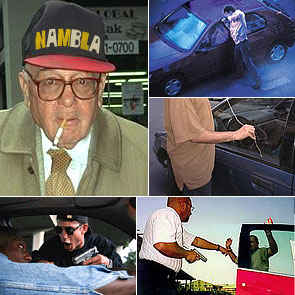 As
a rookie, it becomes your responsibility to contort the actions, dress, and
location of any given person in such a way that he or she can be classified
as or a threat to community safety. As
a rookie, it becomes your responsibility to contort the actions, dress, and
location of any given person in such a way that he or she can be classified
as or a threat to community safety.
Individuals who loiter near schools, playgrounds, public toilets, and swimming
pools may be predatory sex perverts. Men loitering near a business employing
women, such as telephone companies, bakeries, or hospitals, may very well be
muggers.
Those loitering near clubs and bars at closing time may be drunk rollers
—individuals who specifically target intoxicated patrons fresh from the ATM
machine. Overweight, rubber-faced men lurking near commercial business centers
or shopping mall food courts during the morning hours? They could easily be
burglars or hamburglars.
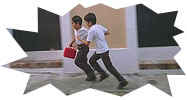  Are
you kids late for class? Looks to me like you're fleeing the scene of a crime!
What's in the lunchbox? Are
you kids late for class? Looks to me like you're fleeing the scene of a crime!
What's in the lunchbox?
If you're a citizen walking down a city street, and you're observed glancing
briefly at a parked car, be prepared to defend yourself against accusations
of auto thievery. If you're a pregnant woman with an unsightly tummy bulge,
be prepared to get strip searched for any concealed weapons. Persons wearing
baggy, bulky, unsightly or off-seasonal clothing are subway taggers, skateboarders,
and shoplifters. Those dressed in religious garb, jingling UNICEF cans from
door to door are home invaders. And persons snoozing with apparent remorse in
door frames, atop high places, near deep water or railroad crossings? They're
contemplating suicide.
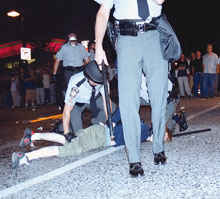  Persons
showing evidence of recent injury (or whose clothing is disheveled) may be perpetrators
of an assault or gangbang. At the scene of a fire, any persons who show excess
(or lack of) emotion, or those whose pants show traces of recent excitement
or ejaculatory splork might be pyromaniacs. Persons
showing evidence of recent injury (or whose clothing is disheveled) may be perpetrators
of an assault or gangbang. At the scene of a fire, any persons who show excess
(or lack of) emotion, or those whose pants show traces of recent excitement
or ejaculatory splork might be pyromaniacs.
And it's widely known within the department that well over ninety-five percent
of incarcerated subjects don't own a wristwatch. This phenomenon is explained
by the fact that persons fitting the criminal archetype rarely care about the
hour of the day. They're largely unemployed or otherwise unconcerned with a
the concept fo maintaining a regular schedule. Some can't even tell you what
day of the week it is! Can you imagine that?
 Tattoos
on your subject offer immediate, physical indications of previous crime habits
and indicate future criminal intent. Juvenile and adult gang members alike tattoo
themselves during incarceration, and a knowledge of this ritual (as well as
the meaning of specific symbols or patterns encountered) will undoubtedly aid
you as you pursue more and more arrests. Tattoos
on your subject offer immediate, physical indications of previous crime habits
and indicate future criminal intent. Juvenile and adult gang members alike tattoo
themselves during incarceration, and a knowledge of this ritual (as well as
the meaning of specific symbols or patterns encountered) will undoubtedly aid
you as you pursue more and more arrests.
Jailhouse tattoos may be distinguished from a professional tattoo
in several ways. The professional tattoo will exhibit finer, more distinct,
black outlines. The professional tattoo will have depth, style, clarity. The
overall design will exhibit both exquisite form and believable proportion. The
professional tattoo artist will usually never place a tattoo on the hands or
face, nor will the professional indulge in lewd patterns, swear words, Nazi
iconography, and the like.
Because inks are not obtainable in prison, inmates are limited by dyes or tints
which can be improvised. Newspaper print from the Sunday funnies are often scraped
and soaked in a communal toilet. This produces a liquid which can be dried later
on to obtain crude ink.
  An
ordinary safety pin is the instrument most often used for tattooing in prison.
These crude instruments produce readily distinguishable tattoos, but piss-poor
inks always yield wide or diffused lines and blue-greenish discoloration. An
ordinary safety pin is the instrument most often used for tattooing in prison.
These crude instruments produce readily distinguishable tattoos, but piss-poor
inks always yield wide or diffused lines and blue-greenish discoloration.
Certain patterns and locations for tattooing can indicate both a criminal
lifestyle and ongoing intent to defraud society.
The tattooing of four-letter words across the knuckles of the hand is universally
found, as are expressions of self-pity on the chest and other parts of the body.
Tattoos on the inner arm are usually designed to conceal needle marks, and some
patterns are inherent to specific cultures, such as the heroin addict's "Linux
penguin" often found below the right shoulder or above the buttocks.
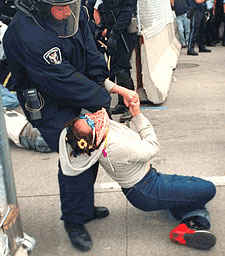 Keep
in mind, a subject's refusal to answer your questions about his tattoos, in
and of itself, is one circumstance which allows you to arrest him for vagrancy. Keep
in mind, a subject's refusal to answer your questions about his tattoos, in
and of itself, is one circumstance which allows you to arrest him for vagrancy.
The Supreme Court has declared it's the duty of every citizen, when called
upon, to disclose all the personal information in his power to the police. And
fortunately, in states like Delaware, New Hampshire and Rhode Island, the length
of a field interrogation can last up to two hours.
While such prolonged detention is neither considered an arrest, nor recorded
in any official record, it allows for large groups to be incarcerated in a single
afternoon shift. Don't waste too much time! There are plenty of other subjects
out there to choose from.
"Other subjects?"
That's right, Officer McFlibbity-Jibbit! I said subjects, not suspects.
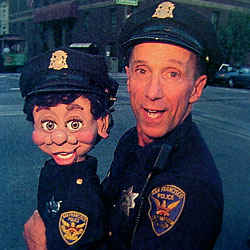 "But
why?" "But
why?"
Because as the required information is being gleaned, it's supremely important
that the field interrogation process not feel like an arrest.
"But why?"
Because that's what differentiates a field interrogation from a legitimate
interrogation.
"Help, help! This guy's got a hand up my ass! Hey lady—wanna see a
woodpecker?"
Oh, Officer McFlibbity-Jibbit! You'll be the death of us all! But it's true:
some subjects need to be treated differently than others. If your arrest quota
reflects a low average, try tailoring your repertoire of field interrogation
techniques to fit other special circumstances.
For instance, an intoxicated person always warrants investigation. It should
be remembered that a drunk usually loses any fear or apprehension of authority
he may have had when sober, and for this reason believes himself invulnerable
to threats and unimpressed with the officer's presence.
Like homosexuals, such persons can be most susceptible to flattery and sympathy
—especially if an officer intimates that (a) the victims were clearly tempting
the suspect, or (b) hints at the possibility of some kind of blowjob/confession
 exchange
program. Down at the station, of course! exchange
program. Down at the station, of course!
 Mentally
defective, feeble minded, senile, or psychotic persons are perfect subjects
for field interrogation. However, an officer must be sure to simplify his vocabulary
and use short questions as required by the subject's span of attention. The
use of questions must be avoided because they only produce erroneous
answers. Often a retarded person raised in a criminal environment will barely
understand popular vernacular. Mentally
defective, feeble minded, senile, or psychotic persons are perfect subjects
for field interrogation. However, an officer must be sure to simplify his vocabulary
and use short questions as required by the subject's span of attention. The
use of questions must be avoided because they only produce erroneous
answers. Often a retarded person raised in a criminal environment will barely
understand popular vernacular.
In these cases, the interrogation will be successful only if the patrolman shouts
at the top of his lungs or enunciates slowly.
 The
questioning of ethnic minorities is a very sensitive subject, indeed
one which requires careful study, great patience, and practice, practice, practice.
A belligerent attitude must be avoided, and usually only a friendly or sympathetic
approach produces the desired results. The most successful method of interrogating
persons of color is for an officer to make the subject feel as if he or she
is being verbally beaten down like a suburban white kid who's only emulating
the subtle cultural nuances of a minority group. The
questioning of ethnic minorities is a very sensitive subject, indeed
one which requires careful study, great patience, and practice, practice, practice.
A belligerent attitude must be avoided, and usually only a friendly or sympathetic
approach produces the desired results. The most successful method of interrogating
persons of color is for an officer to make the subject feel as if he or she
is being verbally beaten down like a suburban white kid who's only emulating
the subtle cultural nuances of a minority group.
The only other legitimate inference (to be drawn purely by skin tone) is to
compare the claimed occupation of a subject with the degree to which his skin
is tanned. A gentleman who claims to work at Starbucks would not be expected
to have a dark sun tan or a weather-beaten face; while a dock worker or telephone
lineman for Pacific Bell would have just such a complexion.
You should be prepared for a variety of reactions when you approach someone
for interrogation. Occasionally, your target may exhibit an overly friendly,
even child-like attitude, punctuating his conversation with an excess
of "no sir" and "yes sir" replies in a desperate attempt to show respect and
obtain your favor. Overly solicitous juveniles should be incarcerated with extreme
prejudice. Further conversation may reveal that he uses the word "sir" in excess
only because prior stretches in prison have trained him against the dangers
of becoming someone else's property.
 |
 An
officer should never attempt to conduct field interrogation on a female
subject when he's alone. As a general rule, women become far more angry
at being selected for interrogation than their male counterparts. In retaliation,
female subjects suspected of prostitution can claim you made improper advances,
or were abusive in some fashion. An
officer should never attempt to conduct field interrogation on a female
subject when he's alone. As a general rule, women become far more angry
at being selected for interrogation than their male counterparts. In retaliation,
female subjects suspected of prostitution can claim you made improper advances,
or were abusive in some fashion.
Two of the primary defenses used by female subjects during interrogation are
fake tears and sexual favors. The former should be understood
and the latter ignored. Tears are induced by frequently touching the eyelids
and the officer should note whether the subject used a handkerchief before or
after the tears were manufactured. Refrain from sex with your female subjects
altogether by masturbating before your shift.
 And then there's lying. The
truth is, everyone lies! A word-for-word repetition of an untruthful person's
story indicates an overly-prepared alibi. Such a narrative unravels if you ask
the subject to repeat it backwards. The most successful method of handling someone
who lies is to point out all the obvious signs of his untruthfulness. Each physiological
indication of lying should be mentioned directly: dry mouth, excessive perspiration,
a change in facial color, continual swallowing, twitching lips, a noticeable
pulse beat in the temples, or dark stains spreading slowly across the trousers.
Call his immediate attention to cliched statements such as "I swear on my mother's
grave," or, "you're standing on my neck." And then there's lying. The
truth is, everyone lies! A word-for-word repetition of an untruthful person's
story indicates an overly-prepared alibi. Such a narrative unravels if you ask
the subject to repeat it backwards. The most successful method of handling someone
who lies is to point out all the obvious signs of his untruthfulness. Each physiological
indication of lying should be mentioned directly: dry mouth, excessive perspiration,
a change in facial color, continual swallowing, twitching lips, a noticeable
pulse beat in the temples, or dark stains spreading slowly across the trousers.
Call his immediate attention to cliched statements such as "I swear on my mother's
grave," or, "you're standing on my neck."
 A
brand new cop in a brand new uniform may feel reluctant to place people under
arrest, for fear of being called "eager" by older, less energetic officers.
But the arrest artists who are most successful at field interrogation have trained
themselves in the required techniques. The i A
brand new cop in a brand new uniform may feel reluctant to place people under
arrest, for fear of being called "eager" by older, less energetic officers.
But the arrest artists who are most successful at field interrogation have trained
themselves in the required techniques. The i ncreasing
ability of an officer to conduct field interrogation depends on the extent to
which he combines natural curiosity and experimentation with good old fashioned
don't-give-a-shitsmanship. ncreasing
ability of an officer to conduct field interrogation depends on the extent to
which he combines natural curiosity and experimentation with good old fashioned
don't-give-a-shitsmanship.
Yes, it can be difficult for a rookie to learn the art of arrest from
his seasoned partner. Often the senior officer may not have mastered the techniques
himself, or he may not possess the instructional ability required to relay the
necessary information. Don't let a veteran office who's grown lazy over time
dominate these interrogations, or prevent you from gaining experience.
Problems occur only when the senior officer does not—or cannot—explain
why he singled out a certain subject for questioning. Experienced patrolmen
might attribute selection of subjects to something as intangible as a "hunch,"
while others conceal their secrets in an attempt to mystify you. With new jails
being built every month, now more than ever what's needed is a daily commitment
to being your own officer. Our citizens demand airtight dedication to
filling our woefully unpopulated prison cells and holding tanks, one criminal
at a time.
Pornopolis |
Rotten |
Faces of Death |
Famous Nudes
|  For
decades, the training of rookie police officers has been largely an accidental
process. New recruits are paired with veteran patrolmen and then thrust suddenly
into the public view. Taking someone into custody for the first time can be
a thrilling experience, but what's the best way to proceed?
For
decades, the training of rookie police officers has been largely an accidental
process. New recruits are paired with veteran patrolmen and then thrust suddenly
into the public view. Taking someone into custody for the first time can be
a thrilling experience, but what's the best way to proceed?
 It
comes across as a breezy, casual dialog which attempts to learn the identity
of your subject, his business in the area, and his possible connection with
any criminal activity, real or imagined. By way of subtle, nuanced manipulation,
field interrogators can effectively incarcerate individuals or entire groups
with laser precision.
It
comes across as a breezy, casual dialog which attempts to learn the identity
of your subject, his business in the area, and his possible connection with
any criminal activity, real or imagined. By way of subtle, nuanced manipulation,
field interrogators can effectively incarcerate individuals or entire groups
with laser precision.
 As
a rookie, it becomes your responsibility to contort the actions, dress, and
location of any given person in such a way that he or she can be classified
as or a threat to community safety.
As
a rookie, it becomes your responsibility to contort the actions, dress, and
location of any given person in such a way that he or she can be classified
as or a threat to community safety.
 Are
you kids late for class? Looks to me like you're fleeing the scene of a crime!
What's in the lunchbox?
Are
you kids late for class? Looks to me like you're fleeing the scene of a crime!
What's in the lunchbox?

 Persons
showing evidence of recent injury (or whose clothing is disheveled) may be perpetrators
of an assault or gangbang. At the scene of a fire, any persons who show excess
(or lack of) emotion, or those whose pants show traces of recent excitement
or ejaculatory splork might be pyromaniacs.
Persons
showing evidence of recent injury (or whose clothing is disheveled) may be perpetrators
of an assault or gangbang. At the scene of a fire, any persons who show excess
(or lack of) emotion, or those whose pants show traces of recent excitement
or ejaculatory splork might be pyromaniacs. Tattoos
on your subject offer immediate, physical indications of previous crime habits
and indicate future criminal intent. Juvenile and adult gang members alike tattoo
themselves during incarceration, and a knowledge of this ritual (as well as
the meaning of specific symbols or patterns encountered) will undoubtedly aid
you as you pursue more and more arrests.
Tattoos
on your subject offer immediate, physical indications of previous crime habits
and indicate future criminal intent. Juvenile and adult gang members alike tattoo
themselves during incarceration, and a knowledge of this ritual (as well as
the meaning of specific symbols or patterns encountered) will undoubtedly aid
you as you pursue more and more arrests.

 An
ordinary safety pin is the instrument most often used for tattooing in prison.
These crude instruments produce readily distinguishable tattoos, but piss-poor
inks always yield wide or diffused lines and blue-greenish discoloration.
An
ordinary safety pin is the instrument most often used for tattooing in prison.
These crude instruments produce readily distinguishable tattoos, but piss-poor
inks always yield wide or diffused lines and blue-greenish discoloration. Keep
in mind, a subject's refusal to answer your questions about his tattoos, in
and of itself, is one circumstance which allows you to arrest him for vagrancy.
Keep
in mind, a subject's refusal to answer your questions about his tattoos, in
and of itself, is one circumstance which allows you to arrest him for vagrancy. "But
why?"
"But
why?"
 exchange
program. Down at the station, of course!
exchange
program. Down at the station, of course!  Mentally
defective, feeble minded, senile, or psychotic persons are perfect subjects
for field interrogation. However, an officer must be sure to simplify his vocabulary
and use short questions as required by the subject's span of attention. The
use of questions must be avoided because they only produce erroneous
answers. Often a retarded person raised in a criminal environment will barely
understand popular vernacular.
Mentally
defective, feeble minded, senile, or psychotic persons are perfect subjects
for field interrogation. However, an officer must be sure to simplify his vocabulary
and use short questions as required by the subject's span of attention. The
use of questions must be avoided because they only produce erroneous
answers. Often a retarded person raised in a criminal environment will barely
understand popular vernacular. The
questioning of ethnic minorities is a very sensitive subject, indeed
one which requires careful study, great patience, and practice, practice, practice.
A belligerent attitude must be avoided, and usually only a friendly or sympathetic
approach produces the desired results. The most successful method of interrogating
persons of color is for an officer to make the subject feel as if he or she
is being verbally beaten down like a suburban white kid who's only emulating
the subtle cultural nuances of a minority group.
The
questioning of ethnic minorities is a very sensitive subject, indeed
one which requires careful study, great patience, and practice, practice, practice.
A belligerent attitude must be avoided, and usually only a friendly or sympathetic
approach produces the desired results. The most successful method of interrogating
persons of color is for an officer to make the subject feel as if he or she
is being verbally beaten down like a suburban white kid who's only emulating
the subtle cultural nuances of a minority group.
 An
officer should never attempt to conduct field interrogation on a female
subject when he's alone. As a general rule, women become far more angry
at being selected for interrogation than their male counterparts. In retaliation,
female subjects suspected of prostitution can claim you made improper advances,
or were abusive in some fashion.
An
officer should never attempt to conduct field interrogation on a female
subject when he's alone. As a general rule, women become far more angry
at being selected for interrogation than their male counterparts. In retaliation,
female subjects suspected of prostitution can claim you made improper advances,
or were abusive in some fashion. And then there's lying. The
truth is, everyone lies! A word-for-word repetition of an untruthful person's
story indicates an overly-prepared alibi. Such a narrative unravels if you ask
the subject to repeat it backwards. The most successful method of handling someone
who lies is to point out all the obvious signs of his untruthfulness. Each physiological
indication of lying should be mentioned directly: dry mouth, excessive perspiration,
a change in facial color, continual swallowing, twitching lips, a noticeable
pulse beat in the temples, or dark stains spreading slowly across the trousers.
Call his immediate attention to cliched statements such as "I swear on my mother's
grave," or, "you're standing on my neck."
And then there's lying. The
truth is, everyone lies! A word-for-word repetition of an untruthful person's
story indicates an overly-prepared alibi. Such a narrative unravels if you ask
the subject to repeat it backwards. The most successful method of handling someone
who lies is to point out all the obvious signs of his untruthfulness. Each physiological
indication of lying should be mentioned directly: dry mouth, excessive perspiration,
a change in facial color, continual swallowing, twitching lips, a noticeable
pulse beat in the temples, or dark stains spreading slowly across the trousers.
Call his immediate attention to cliched statements such as "I swear on my mother's
grave," or, "you're standing on my neck." A
brand new cop in a brand new uniform may feel reluctant to place people under
arrest, for fear of being called "eager" by older, less energetic officers.
But the arrest artists who are most successful at field interrogation have trained
themselves in the required techniques. The i
A
brand new cop in a brand new uniform may feel reluctant to place people under
arrest, for fear of being called "eager" by older, less energetic officers.
But the arrest artists who are most successful at field interrogation have trained
themselves in the required techniques. The i ncreasing
ability of an officer to conduct field interrogation depends on the extent to
which he combines natural curiosity and experimentation with good old fashioned
don't-give-a-shitsmanship.
ncreasing
ability of an officer to conduct field interrogation depends on the extent to
which he combines natural curiosity and experimentation with good old fashioned
don't-give-a-shitsmanship.